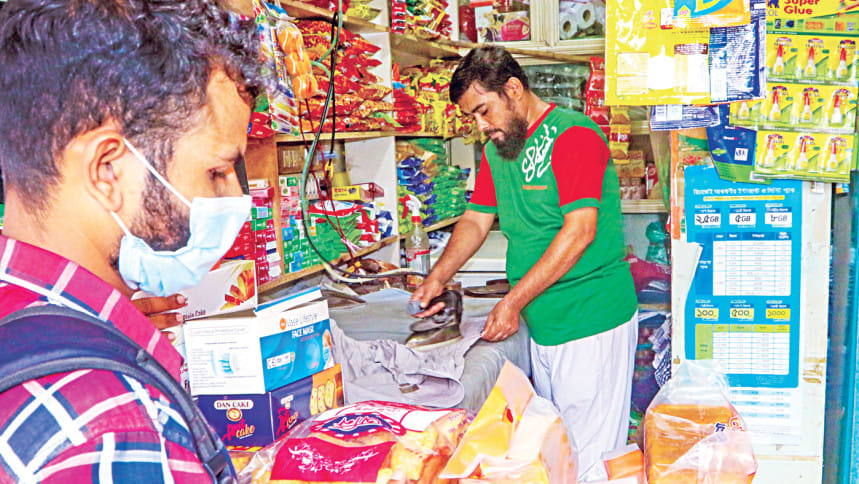Small traders diversify income to stay afloat

Shafiqul Islam Ratan has been running a sweet shop with his siblings near a residential area on Kalshi road in the capital's Mirpur for the last six-seven years.
The business was going on well since its inception in 2015. But the onslaught of the coronavirus in Bangladesh in March last year upended everything in the blink of an eye as the government enforced lockdowns and people stayed away.
As educational institutions shut and religious festivals and nuptial programmes were held with limited attendance, the demand for sweets reduced significantly.
The crash in income made it difficult for the family to pay shop rent, electricity, security and other bills.
With little sales and no support from the government, Ratan added grocery items to his shop to make some bucks.
"By selling grocery items, we are making some money. Now I can pay shop rent and other bills," he said.
Nazrul Islam, owner of Johny Telecom and Dry Cleaners, faced a similar challenge.
He has been running the shop in the extended Pallabi residential area in Mirpur since 2005.
He was in trouble when the government slapped movement restrictions to contain the spread of the novel Covid-19, banning non-essential activities and businesses.
For Islam, the only way to get out of the crisis was to sell groceries.
In May 2020, he borrowed Tk 1.5 lakh from three non-government organisations to start his new venture besides keeping the laundry and mobile recharge shop open.
"I have to feed my family. That is why I have taken this path."
People who used to be customers of his laundry and mobile recharge shop are now buying groceries from him regularly.
"Besides, I have got some new customers," Islam said.
Ratan and Islam are just two of the millions of small businessmen in Bangladesh whose earnings fell to "near-zero" at the height of the first wave nearly a year ago.
A whopping 94 per cent of micro, small and medium enterprises experienced a sharp drop in sales because of the coronavirus pandemic, according to a survey of the International Finance Corporation and the World Bank last year.
There are about 56 lakh wholesale and retail establishments in Bangladesh.
Most MSMEs are still struggling as their incomes have not risen to the pre-pandemic level because of the lingering economic slowdown.
The second wave, which compelled the government to reinstate strict lockdowns in April, has shattered their recovery. As a result, they have had to diversify income opportunities.
Sheikh Mohammad Farid, a businessman in the West Tejturi Bazar area, used to sell vegetables before the pandemic.
When he saw that he could not manage the house rent by selling vegetables, he started selling groceries and cosmetics items.
"A shopper gets a lot of things from my store," Farid said.
Rahim Sarkar used to operate a laundry shop in Karwan Bazar area. But his customers also stopped coming. He started selling bananas.
After three months, he saw that his shop had been able to create a customer base. As a result, revenue has started to stream in again.
"I started selling bananas to save my laundry business," Sarkar said.
Mosharraf Hossain, owner of Dhaka Dry Cleaners in Rupnagar area of Mirpur, has been running a laundry shop since 2014. Before the pandemic, he used to earn Tk 20,000-22,000 per month.
When he was able to open the shop in June last year after lockdowns eased, the business had fetched a maximum of Tk 5,000 a month, nowhere near his monthly expenses.
So, Hossain added groceries to his shop in March this year. His income is rebounding.
"Thanks to the two businesses, I can now run my family. However, the business is not as thriving as before."
The policy the shoppers have adopted as part of their coping strategy after being forced into the Covid-induced crisis is very positive, said Sayema Haque Bidisha, a professor of the department of economics at the University of Dhaka.
"But which business (first or second) will be sustained will depend on how well the economy recovers from the Covid-19 crisis."
Hossain Zillur Rahman, executive chairman of the Power and Participation Research Centre, said the people in distress were looking for extra income.
"Income from their main professions collapsed. So, they were forced to find a way to earn extra money. This has increased the labour-hour. The thing is, people are not sitting idle."
However, the former caretaker government adviser said the new income opportunities might not yield the same level of earnings they had before the onset of the pandemic.
"How much state support is there remains to be seen. They are in trouble, and we have to work on how to help them."
He called for a separate stimulus package for the small business.


 For all latest news, follow The Daily Star's Google News channel.
For all latest news, follow The Daily Star's Google News channel. 



Comments